Thrasio

(Illustrations by Cristina Spanò)
If you’ve shopped on Amazon recently (that “if” seems rhetorical these days), there’s a good chance you’ve bought or viewed a product from one of Thrasio’s brands. Having raised more than $1.75 billion since its debut in 2018, the company — founded by co-CEOs Joshua Silberstein W97 and Carlos Cashman — has skyrocketed to unicorn status in its quest to buy and grow third-party private-label Amazon businesses. (TechCrunch recently estimated the company’s valuation to be at least $3 billion.) In a sign of broader consolidation for brands on the site, Thrasio had acquired nearly 100 of them as of early February and was closing more deals every week.
Caire Beauty
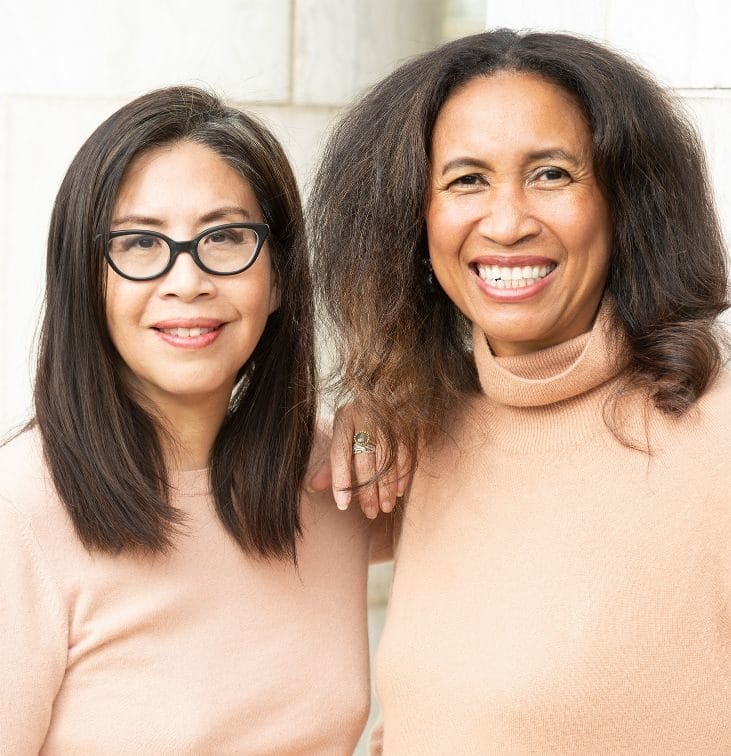
Celeste Lee W84 and Lorrie King WG91 (Photo by Gerald Janssen)
A 2020 Female Founders Fund report projects there will be one billion postmenopausal women worldwide by 2025 — which equates to $600 billion in potential consumer spending. But few self-care products target women who are over 40 years old. Caire Beauty hopes to make up for lost time. Co-founders Lorrie King WG91 and Celeste Lee W84, two longtime beauty-industry veterans, launched the direct-to-consumer company last November. Caire uses proprietary skin-care science to meet the declining-estrogen challenges of more experienced skin. The investment in healthy skin has paid off: The Wall Street Journal recently highlighted Caire as one of the few menopause-specific beauty and wellness brands.
Triyo Fitness
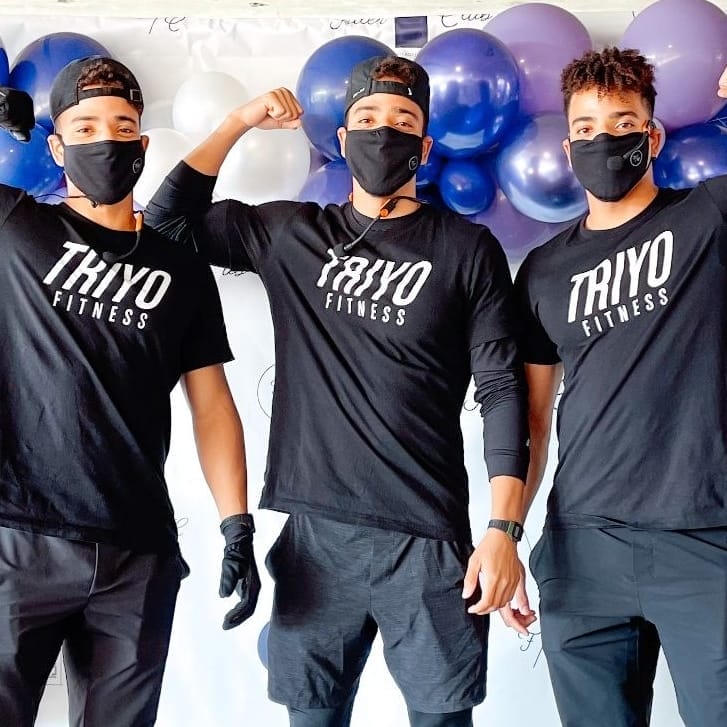
Malik Jones W18, Khalil Jones C18, and Ahmad Jones C18
Just before the pandemic struck, a Centers for Disease Control and Prevention report found that more than 15 percent of American adults made no time for exercise. With the closing of gyms and with commutes eliminated by remote work, staying active became even more challenging. Identical triplets Malik Jones W18, Khalil Jones C18, and Ahmad Jones C18 found themselves well-positioned to fight inactivity with Triyo Fitness. Launched in 2018, their workout program pivoted from in-person classes to an online platform, based on the high-energy fitness routines they conducted during their time at Penn. In the early days of COVID-19, the Joneses shared tips for remote exercise on Good Morning America. Next up for the trio and Triyo: launching an app.
Frutero
 I scream, you scream, we all scream for … Frutero! Co-founded by Mike Weber WG20 and Vedant Saboo WG20, Frutero combines exotic produce from Colombia and Thailand with local Philadelphia dairy to offer consumers a delicious new dessert — tropical-fruit ice cream with no artificial flavors or preservatives. The pair were inspired by Weber’s first visit to India in 2018, when he tried local iterations of the icy treat. With backing from Venture Lab’s Venture Initiation Xcelerate Program and 2020 Startup Challenge Launch Award, Weber and Saboo have expanded their dessert empire via online delivery and onto shelves across the East Coast, including those at Giant and Whole Foods, making it easier for customers to get their fruity fix.
I scream, you scream, we all scream for … Frutero! Co-founded by Mike Weber WG20 and Vedant Saboo WG20, Frutero combines exotic produce from Colombia and Thailand with local Philadelphia dairy to offer consumers a delicious new dessert — tropical-fruit ice cream with no artificial flavors or preservatives. The pair were inspired by Weber’s first visit to India in 2018, when he tried local iterations of the icy treat. With backing from Venture Lab’s Venture Initiation Xcelerate Program and 2020 Startup Challenge Launch Award, Weber and Saboo have expanded their dessert empire via online delivery and onto shelves across the East Coast, including those at Giant and Whole Foods, making it easier for customers to get their fruity fix.
SPRK
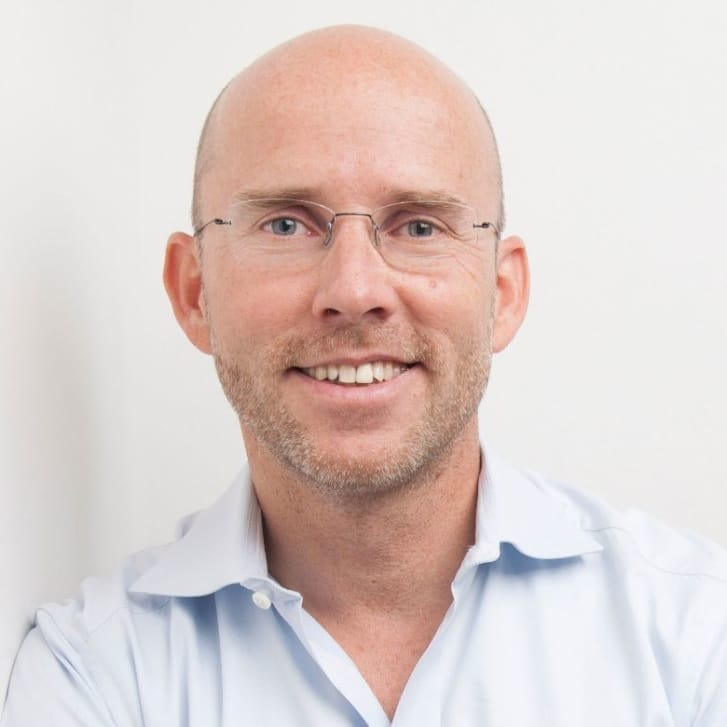
Alexander Piutti G96 WG96
The global food supply chain is both essential and deeply flawed, contributing to 1.6 billion tons of annual food waste and, in the process, plenty of carbon emissions. SPRK thinks it found a solution to both those problems by using artificial intelligence to move millions of tons of surplus inventory to those who need it. Lauder grad Alexander Piutti G96 WG96 launched SPRK in Berlin in 2019 and aims to build a global network that could become the “Amazon of food oversupply,” as he told Forbes. Piutti’s ambitious mission is off to a fast start: Samsung’s Extreme Tech Challenge, aimed at solving problems facing humanity and the planet, named SPRK one of eight 2020 worldwide winners.
WorkWhile
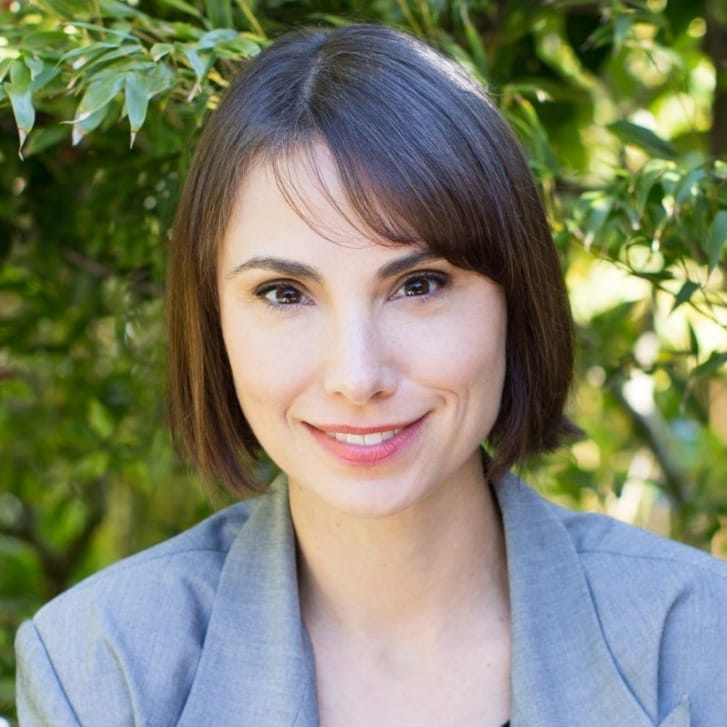
Jarah Euston WG09
WorkWhile is rethinking how hourly employees earn their wages — and delivering better benefits in the process. Co-founded by Jarah Euston WG09, the venture is a matchmaking service of sorts that pairs workers with employers to fill everything from full-time positions to temporary jobs to last-minute shifts. Companies pay a fee to tap into the WorkWhile workforce, which is made up of screened and verified applicants who receive often-elusive job perks like next-day pay, flexible schedules, and sick-leave credits. Euston’s company, which aims to promote more flexible conditions for both companies and workers, was recently backed by investors including Khosla Ventures and Katrina Lake, founder and CEO of Stitch Fix.
FindAShot
 The rollout of the COVID-19 vaccine in the U.S. presented both hope and a new pandemic challenge — navigating a maze of distributors, websites, and eligibility restrictions to find and book an appointment. In January, quick-acting Wharton Executive MBA student David Newell WG21 founded the volunteer-driven FindAShot organization to cut through the chaos and help ease the process for individuals searching for a vaccine. FindAShot’s website offers a centralized search for appointments at pharmacies and other locations in a given area, along with links to eligibility guidelines for each state.
The rollout of the COVID-19 vaccine in the U.S. presented both hope and a new pandemic challenge — navigating a maze of distributors, websites, and eligibility restrictions to find and book an appointment. In January, quick-acting Wharton Executive MBA student David Newell WG21 founded the volunteer-driven FindAShot organization to cut through the chaos and help ease the process for individuals searching for a vaccine. FindAShot’s website offers a centralized search for appointments at pharmacies and other locations in a given area, along with links to eligibility guidelines for each state.
Data.world
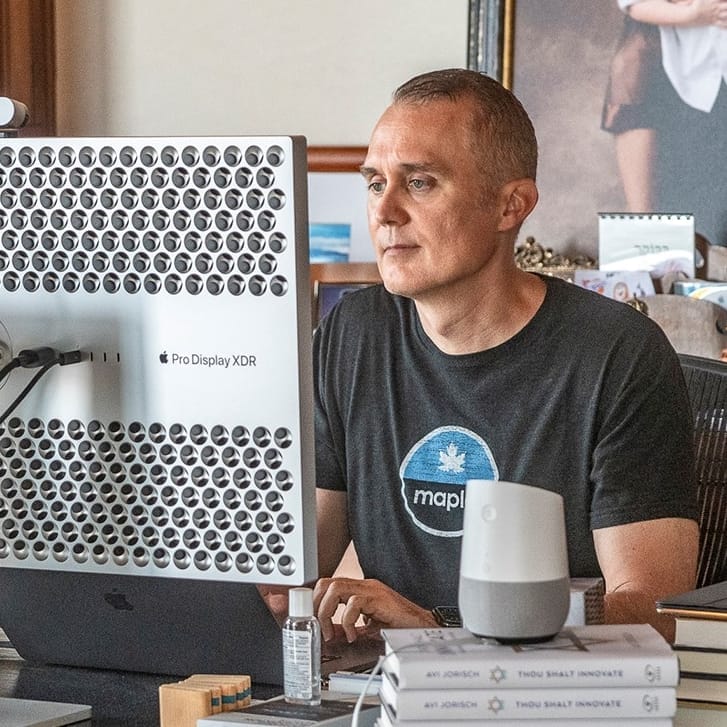
Brett Hurt WG99
While it’s simpler than ever to collect data nowadays, distributing it to employees who need — and can understand — it is a different story. That’s where Data.world comes in. Led by CEO Brett Hurt WG99, the venture offers a central platform for anyone to discover and use a company’s data, as well as for co-workers to collaborate using the information. It’s not hard to see the potential across industries, and in a major show of confidence, the Associated Press has invested in the company; Hurt calls his business a game changer for data journalists seeking quick access to information.
Habi
 Habi grew out of an acute need for a better way to buy and sell homes in Latin America. Preparing to move from the U.S. to Bogotá, Colombia, in 2016, co-founder Brynne McNulty Rojas W10 found it difficult to locate a place to live beforehand: There wasn’t an effective online real estate database for the area, meaning her search wasn’t successful until she was on the ground. With a business partner from the region, McNulty has built a database of prices for middle-class homes and other information, along with an Opendoor-like service through which they buy, renovate, and resell Colombian properties. Following a fresh round of investment last year, Habi is poised to expand to other parts of the continent, with a promise to reduce sale times from several months to several days.
Habi grew out of an acute need for a better way to buy and sell homes in Latin America. Preparing to move from the U.S. to Bogotá, Colombia, in 2016, co-founder Brynne McNulty Rojas W10 found it difficult to locate a place to live beforehand: There wasn’t an effective online real estate database for the area, meaning her search wasn’t successful until she was on the ground. With a business partner from the region, McNulty has built a database of prices for middle-class homes and other information, along with an Opendoor-like service through which they buy, renovate, and resell Colombian properties. Following a fresh round of investment last year, Habi is poised to expand to other parts of the continent, with a promise to reduce sale times from several months to several days.
Fudena

(Photo by Erica Xin)
What’s in a name? In the case of Fudena, both inspiration and mission for first-generation Ghanaian American Ruth Nakaar WG20. Based on a phrase in the Dagaare language that translates to “Have you eaten,” Fudena is a takeout and delivery restaurant adding West African flavor and fast-casual convenience to Philadelphia’s dining scene. Nakaar offers a customizable selection of grain and stew bowls with a variety of meat and vegetable choices and clever names with pop-culture nods, including Waakye Is Bae (rice, black-eyed peas, curried goat, caramelized onions) and a hip-hop-inspired coconut rice/tilapia bowl.
BigSpring

Bhakti Vithalani WG06
While technology has made it easy to roll out on-the-job training programs at scale, companies often still only cater to workers in white-collar roles — a problem BigSpring founder and CEO Bhakti Vithalani WG06 is tackling head-on. A new mobile learning platform for “all collar” jobs, BigSpring is enabling companies to teach workers at every level the skills they need for their positions and, similarly, offering re-skilling opportunities for displaced workers. Companies from Google to India’s Tata Steel have benefited from the app, which has provided training to more than a million learners globally and was named a World Economic Forum 2020 “Technology Pioneer.”
Mansa Tea
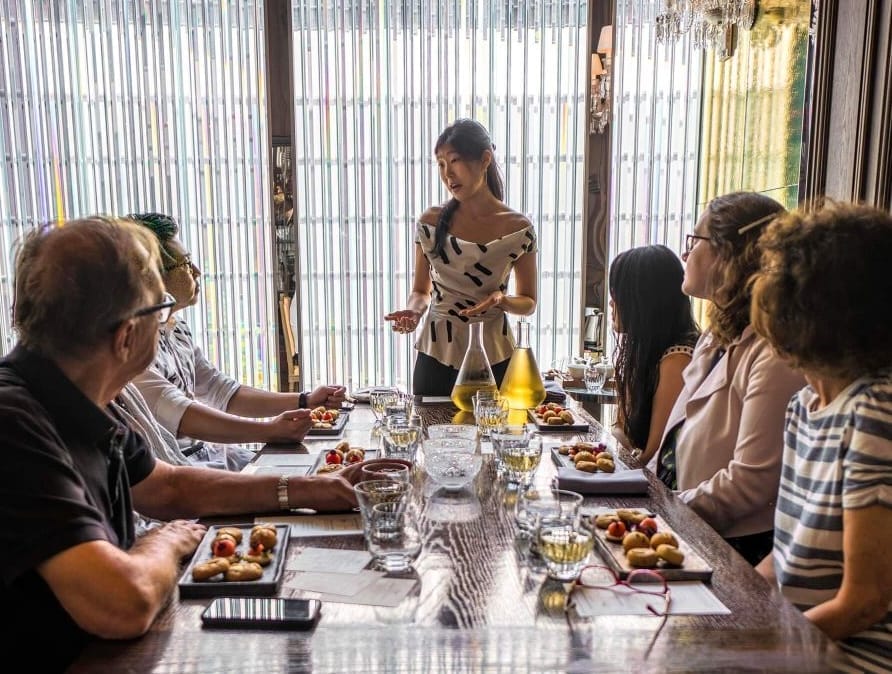
Ashley Lim WG18
“Life is too short to drink bad tea.” That’s the raison d’être of Mansa Tea, founded by Ashley Lim WG18 and inspired by her father’s love of pu’er, originating in China’s Yunnan province. Initially launched to service high-end restaurants and luxury hotels, Mansa shifted to a direct-to-consumer model during the COVID pandemic while maintaining its focus — sourcing the highest-quality tea and aging it to achieve peak flavor with only one ingredient, tea leaves. Lim, a certified tea sommelier, also aims to educate aspiring tea connoisseurs through monthly tastings, virtual workshops, and corporate events.
Sidecar Health
 When he realized that paying the cash price for an MRI rather than the insurance company’s negotiated rate would save him nearly $1,000, Patrick Quigley WG03 knew he had an idea that could transform the health-insurance industry. He co-founded Sidecar Health in 2018 around a “cash price” model that enables members to enroll any time, see any doctor, pay lower prices to their health-care providers, and view what providers have charged other members for services. This transparency lets members comparison-shop for health care as they would for any other product or service. Currently available in 16 states, the company recently raised $125 million in its Series C round of funding to reach a valuation of $1 billion and expand its mission to make health care more accessible, affordable, and transparent for all Americans.
When he realized that paying the cash price for an MRI rather than the insurance company’s negotiated rate would save him nearly $1,000, Patrick Quigley WG03 knew he had an idea that could transform the health-insurance industry. He co-founded Sidecar Health in 2018 around a “cash price” model that enables members to enroll any time, see any doctor, pay lower prices to their health-care providers, and view what providers have charged other members for services. This transparency lets members comparison-shop for health care as they would for any other product or service. Currently available in 16 states, the company recently raised $125 million in its Series C round of funding to reach a valuation of $1 billion and expand its mission to make health care more accessible, affordable, and transparent for all Americans.
SoLa Impact
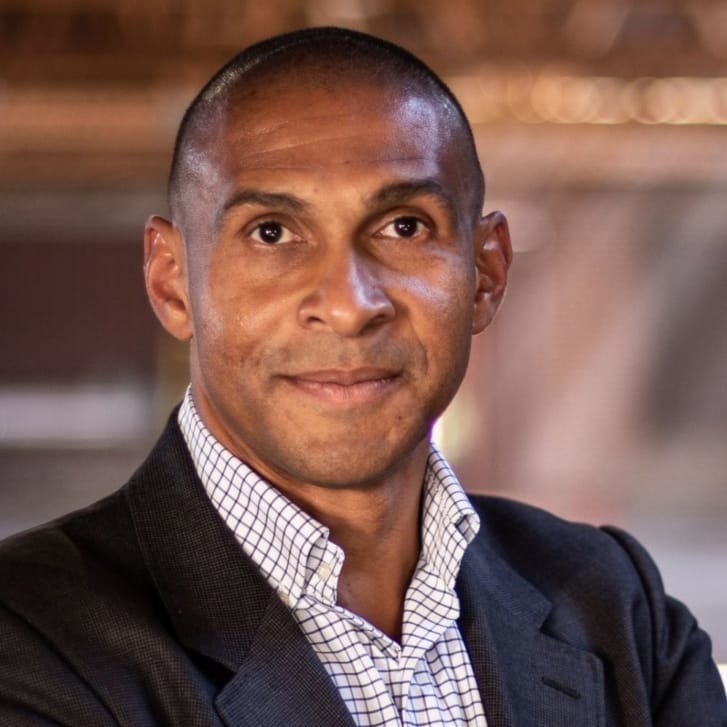
Martin Muoto C93 W93
The mission of Martin Muoto C93 W93 is clear: to level the housing playing field for Black and brown communities across the United States. Muoto founded SoLa Impact in a garage in 2015 and has since seen the company grow into Los Angeles’s largest Section 8 landlord. Today, SoLa Impact runs $180 million in affordable housing and commercial real estate funds in minority neighborhoods around the city. And with the announcement of SoLa Impact’s new Black Impact Fund, which aims to raise $1 billion to invest in and near designated opportunity zones, Muoto is looking to establish one of the largest commercial real estate funds ever to focus on minority neighborhoods.
Published as “Housing Solutions, Transformative Health Care, and Tropical Treats” in the Spring/Summer 2021 issue of Wharton Magazine.
Read about other alumni-powered ventures in the full Watchlist.
























